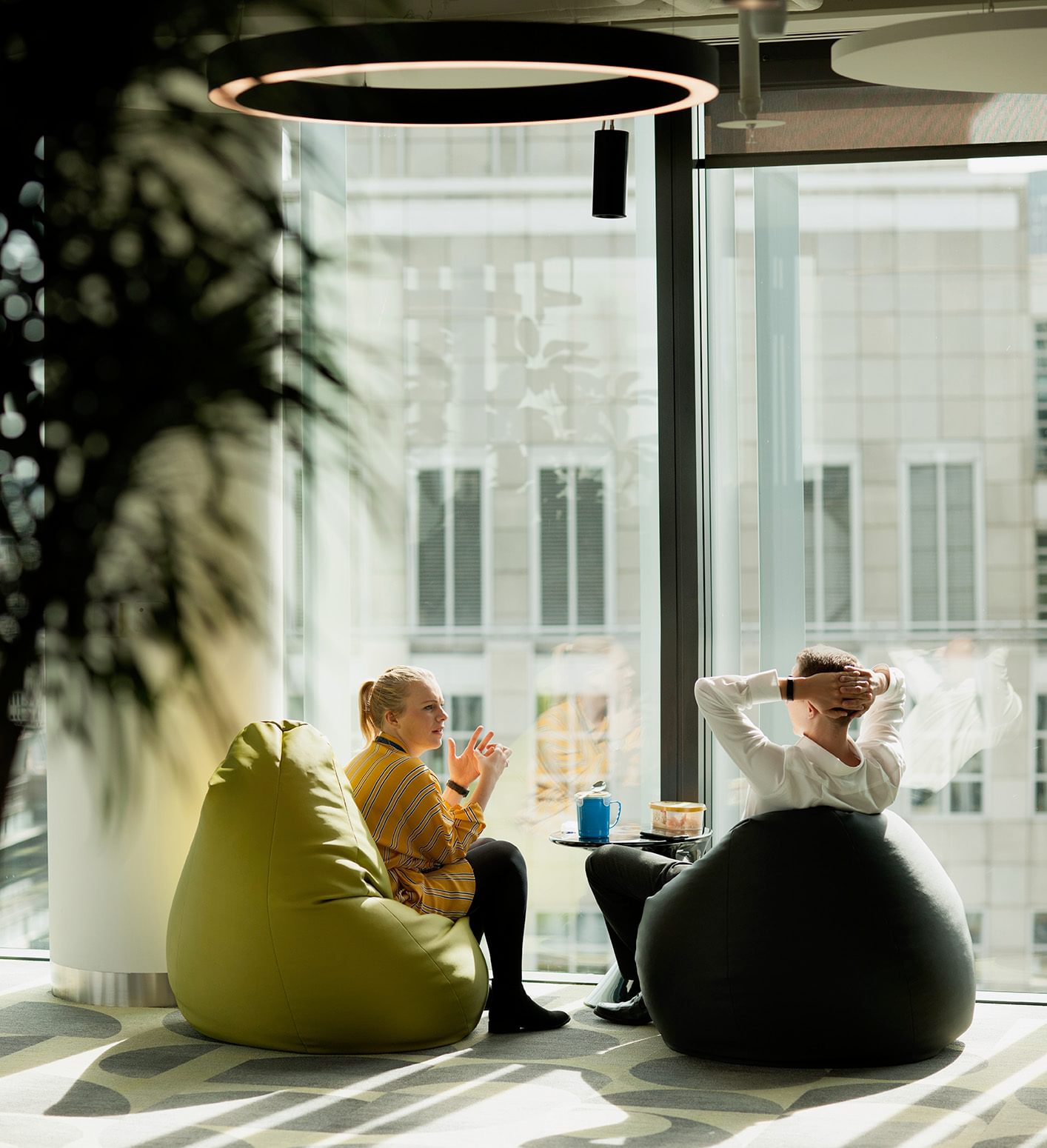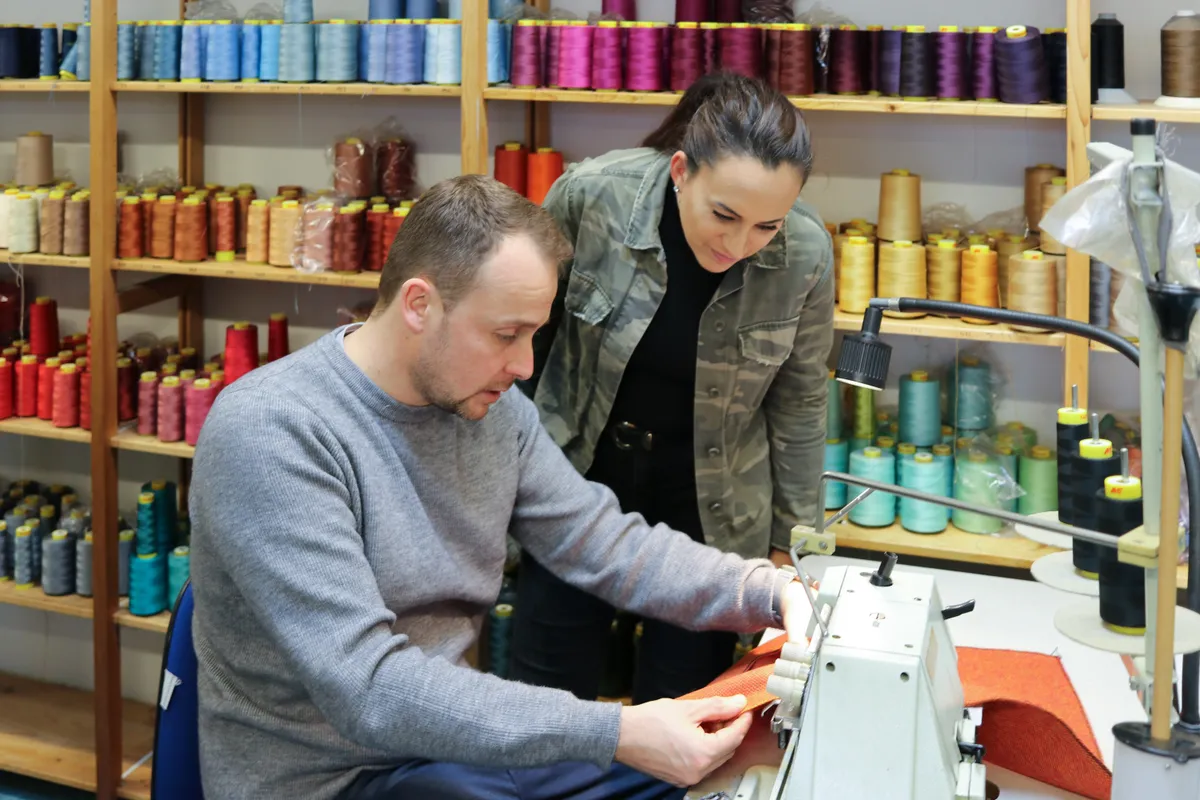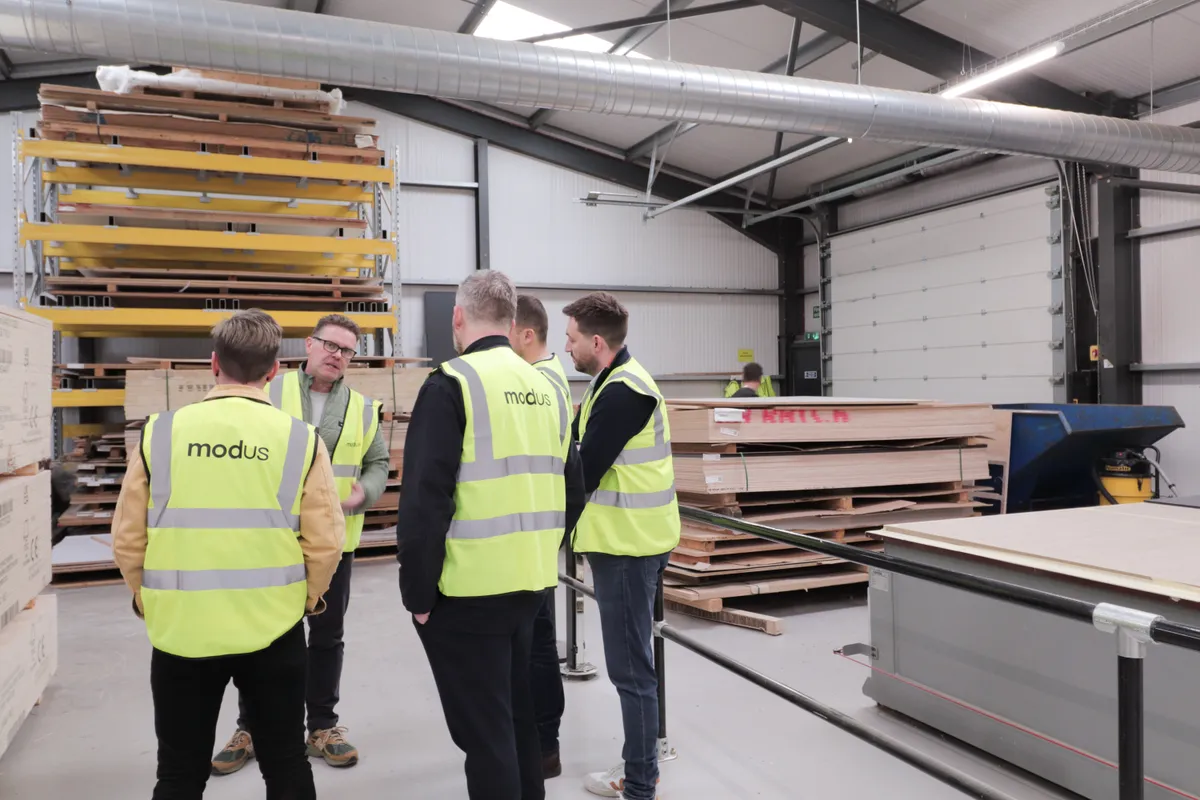Furniture Consultants: Decoding Their Value Proposition
Hiring a furniture consultant is an investment. What's the return you get from going the extra mile on your new workplace project with a professional?


Written by
Fritha Selwyn-Jones
Contents
When someone walks into your workplace, what happens? The space gives an immediate impression, which impacts that individual’s mood and perception of your company. The impact of your workplace interior has a profound effect on anyone spending time there, influencing energy levels and even mental health. We spend so much time at work that it’s crucial that we get workplace design right so we protect our bodies and minds and give them opportunities to grow.
This is the power wielded by a good furniture consultant. Furnishing a workplace is more than just arranging furniture in a convenient way. Here, we decode exactly what that transformative power is and the value it can bring to your workplace.
The Value of a Furniture Consultant
What a Furniture Consultant Does
Fundamentally, a furniture consultant is responsible for envisioning and managing the execution of the entire workplace furnishing project. This could be a standalone project or the final stage in a larger construction, fit-out, or renovation project. The journey of a furniture consultant could start when the space is completely bare or when it’s already been full and used for years and desperately needs a revamp. They simply have to adapt to whatever the project requires.
The furniture consultant is responsible for assessing the space’s capacity against the organisation's demands and specifying the right furnishing choices regarding functionality, comfort, brand, efficiency, space compatibility, sustainability, and safety, plus any other business requirements.
The goal of this work is to optimise the workplace within the bounds of the project—space, budget, time constraints, inclusivity, and so on. Here’s a list of the responsibilities of the furniture consultant in their role:
Assess client needs and preferences
Provide design recommendations
Create custom furniture solutions
Ensure the quality and durability of furniture
Coordinate with interior designers, architects, contractors, suppliers, and project managers
Manage budget and project timelines
Oversee furniture installation
Offer post-installation support and maintenance advice
The Value a Furniture Consultant Brings
Hiring a professional to advise and manage furnishing your workplace comes at a cost, so naturally, you want to know what value they bring that you couldn’t just provide yourself. On the surface, a furniture consultant looks like someone who knows about industry design trends, understands which colours go with what textures, and has all the ideas for maximising space. In fact, it’s so much more than that.
Aspect of Furnishing | Do it Yourself | Hire a Furniture Consultant |
Design Expertise | Limited to personal taste and online research | Professional knowledge of design principles and industry trends |
Space Optimisation | Maximising space with basic principles like multi-use units | Trained in space-planning approaches and industry insights |
Material Selection | Reliance on suppliers for basic quality and sustainability features | Non-biased understanding of quality and sustainability markers against budget options |
Budget Management | Unforeseen costs can lead to poor allocation | Efficient budget management, wide network of suppliers, better cost forecasting |
Supplier Relationships | Limited access to suppliers and potential high costs | Established relationships with reputable vendors and vetting processes |
Project Management | Takes away from your day-to-day business operations | Smooth and professional project management is handled for you |
Installation | Time-consuming, dangerous, potential errors | Professionally managed and supervised |
Long-term Value | Risk of choices that lead to early replacement | Aims for longevity and adaptability |
Sustainability | Limited awareness of sustainable options | Expertise in sustainable practices and eco-friendly materials |
Ergonomics | Basic understanding of ergonomic principles | Expert advice on ergonomic furniture to enhance comfort and productivity |
Aftercare Support | No aftercare | Support and monitoring from a reassuring presence as your team beds in |

Bespoke Solutions for Unique Needs
Depending on a company’s budget and other needs, furnishing options range from a turnkey approach to a completely bespoke service. Neither is the better option; it all depends on the priorities and what’s available within the limitations of the project. A top-tier furniture consultant should be able to deliver both to success.
Do you need bespoke consultancy or a turnkey solution?
How do you determine whether you need a bespoke or turnkey solution to workplace furnishing?
Bespoke Consultancy
The bespoke approach offers solutions that are completely tailored to your needs. Your end result will be entirely unique to your business, fulfilling your needs and preferences precisely. This approach ensures a highly personalised design that aligns with your brand, work culture, and values; as well as obvious functional demands.
A bespoke solution also means there’s space to adjust and refine the project as it progresses. You’ll have access to opportunities and ongoing expertise that go beyond the standard options. Ultimately, a bespoke service is a premium one that offers high-quality craftsmanship, materials, and results.
Ideal for:
Those with specific or unique visions or requirements
Projects that require a high level of attention to detail or customisation
Those seeking an active role in the process and who value expert guidance
Turnkey Solution
By contrast to the bespoke bells and whistles approach, a turnkey solution is a more efficient, streamlined, and all-inclusive service. It’s designed to provide clients with a faster, cheaper result that guarantees certain key performance markers. With a turnkey solution, you know what to expect at the beginning and can remove yourself from the project, trusting that your furniture consultant will deliver that.
This type of solution is not necessarily always a ‘one size fits all’ but a modular approach which can be applied to any space in a mix-and-match format. Because of its pre-planned and pre-designed elements, a turnkey solution can be implemented quickly, and the costs of consultation are lower because there’s less intervention from the furniture consultant.
Bespoke furniture consultancy is where professionals really get to demonstrate their flare. We favour the bespoke approach because it’s where we can be sure the client’s workplace fully supports the myriad needs of the workforce, down to the details.

A Holistic Approach to Design
Today, more and more designers see the value in the holistic design approach: one that considers all factors affecting the business and the space together and responds with a solution that answers all of these demands.
The holistic approach to our work sees furniture not just as a means to optimise productivity or to ensure sustainability KPIs are achieved. Rather it considers every factor that will be influenced by the project and how these can be integrated to provide a streamlined solution that is greater than the sum of its parts.
A definition of holistic furniture consultancy:
A comprehensive approach that considers all aspects affected by the project (wellbeing, sustainability, functionality, aesthetics, brand, collaboration, and more) and produces a cohesive environment that responds to all of these demands to enhance the result.
Balancing the science of function with the aesthetics of form is key to a successful furnishing solution, and holistic design takes this challenge head-on.
Implementing the Holistic Approach
The holistic approach starts with research gathering. This stage could not be more important in setting up the project for a thorough and cohesive solution that incorporates an answer to every business need. Without a detailed scope of what the project entails, it cannot be holistic. Simply: it cannot be a solution to unseen challenges.
Holistic project planning involves a multi-level approach to research gathering to attain detailed information and build context around the project. This is all done through a client-centric lens that engages all teams within the business.
Because of its multifaceted perspective, the holistic approach thrives on collaborating across disciplines. Input and communication between architects, interior designers, engineers, sustainability experts, and other stakeholders create a well-rounded project in which every aspect is seamlessly integrated. Opportunities for streamlining are seized here.
This model of collaboration leads to innovative solutions where requirements have been identified and addressed by the relevant experts in a cohesive and well-rounded way. Thanks to its success as an approach, more and more modern workplace furnishing consultants implement a holistic design solution.

Ensuring Longevity and Value
Sometimes, a furniture consultant may seem like an extra cost, and one that a client can cut out if they’re trying to save on budget. In reality, a furniture consultant is an investment that ensures your workplace is well-established for the future and can actually save you costs in the long run.
So, how do furniture consultants ensure the longevity of their projects, providing clients with a workplace that will stand the test of time?
1. Choice of materials
Materials should be selected for their quality and durability to withstand wear and tear. Resistance to moisture, heat, and UV exposure is important. Consultants should be able to identify quality markers and trust signals to determine which materials are best.
2. Craftsmanship
Consultants should select manufacturers carefully to ensure superior construction. Industry insights and networking enable consultants to find and build relationships with the best manufacturers.
3. Sustainability
Materials, manufacturing techniques, and choice of suppliers: Consultants need to know which trust signals to look for to identify truly sustainable and ethical resources for furnishing projects. They should also be designed for easy disassembly and recycling at the end of each product’s lifecycle.
4. Ergonomics and function
Reducing the risk of injury, strain, and discomfort means employees will be happy using furniture for a long time to come. A good consultant will also look for opportunities to install flexible, adaptable, and customisable furniture, like height-adjustable desks, which are a better fit for a wider range of individuals. This also means understanding furniture placement and how to use positioning to optimise the space.
5. Protecting longevity
Finishes, covers, and coatings: furniture should be prepared to weather common, everyday use and protect against minor scuffs, scratches, stains, and moisture issues. Selecting furniture with these qualities ensures the longevity of the space so it looks and functions at its best for as long as possible. Consultants must be able to identify these quality markers.
6. Care of furniture
While selecting items that will withstand the test of time is crucial, it’s also important to inform clients about their proper upkeep. A consultant should be able to fully inform the client on how to clean furniture properly and fix minor issues if they arise.
Hiring a furniture consultant can feel like a big investment, but the return on investment is undeniable. If you value your workforce, providing them with the optimal environment for healthy, happy work is the best investment you can make in your people and brand. Talk to Sketch Studios about how to get started. Our bread and butter is furniture consultancy. Work with us to furnish entirely new spaces, refurbish tired-out workplaces, and even support end-to-end workplace relocations.
Published on
May 24, 2024
Related Articles










